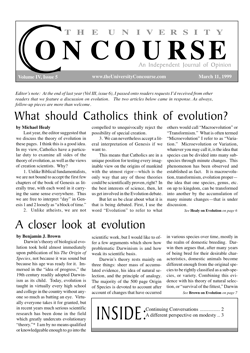FUS needs to get more practical about education
by Peter Cole
Dr. Regis Martin’s article “What liberal educators may not omit” calls for a response. The role of the liberal arts education which is to ground the person in fundamental truths cannot and must not be underrated. Today in corporate America there is a recognition that people must have a background that makes them well-rounded people. This background can only come from some form of liberal arts education.
Precisely what form it should take at this university, however, is often in dispute. While many of our students are in the field of theology and philosophy, the students in other disciplines such as nursing, education, business and the like are involved in programs that do not and cannot give them the time to study at length such things as Dante, Shakespeare, Homer and Dickens. While Homer may be important to make the student well versed in humanities and thus learn how to deal with the person as a whole, the student of Hotel Management has to give priority to those areas such as accounting, business organization, management and finance. This does not mean that the student does not study Homer, but the major part of the two and a half to three hours of study time a student has each day needs to be spent on his area of concentration.
Newman talks of utilitarianism in education, and indeed education should not only be to secure a better job in the work place but also to ground one in fundamental truths. I find it interesting that Dr. Martin’s article makes no mention of computer education and training in such activities as job placement. At the end of the twentieth century no student should receive a BA, BS, MA or MS degree without having enough computer literacy and enough basic training in vocational skills to help them compete with those who do not esteem God or the human person as we do.
Our University provides the liberal arts education quite well. We fall short, however, in preparing our alumni for the reality of life. We should introduce into our English classrooms information on resumes and cover-letters. Our computer labs should be expanded and every student should have at least 3 credits of such a class before graduating. The exit conferences at graduation should be more thorough and cover such areas as job interviews. I wonder how many of our students know of the Career Placement and Planning Office. Do many of our students take part in their services? Personally, I doubt it.
Peter Cole, MS Education program
Peter Cole received a BA in theology from FUS in 1997.


